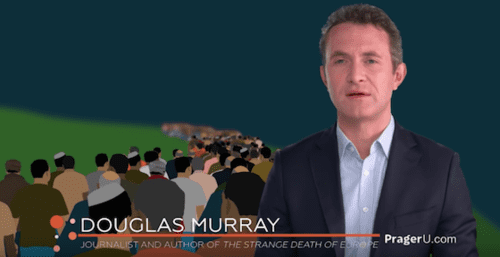
05/16/2018
The Strange Death of Europe: Immigration, Identity Islam, Douglas Murray’s important book, continues to influence the debate on allowing mass immigration of Muslims, a historic enemy of the West. The political problem was Europe’s foolish invitation, led by Germany’s Chancellor Merkel, to millions of dissatisfied muslims to come live in the West. But the psychological cause is a disconnect from the history of Europe civilization, which still includes the Enlightenment.
Murray’s analysis is that Europe’s elite (but not its average citizens) feel a loss of confidence about the last century’s failures of history require the penance of surrendering to the diverse hordes of the Third World. From the outside, it does seem Euro-elites are throwing in the towel on the continent with its complicated history.
Murray has distilled important points from his book into a five-minute explainer for a PragerU video:
Here’s a transcript of the video:
DOUGLAS MURRAY: The civilization born of Judeo-Christian values, ancient Greek philosophy and the discoveries of the Enlightenment is staring at the abyss, brought there by its own hand. To put it starkly: Europe is committing suicide.
How did this happen?
It’s a complicated story, but there are two major causes.
The first is the mass movement of peoples into Europe. This has been going on steadily since the end of World War II but sped up massively in the migration crisis of 2015, when more than a million migrants poured into Europe from the Middle East, North Africa and East Asia.
The second, and equally significant, is that Europe lost faith in itself — its beliefs, its traditions and even its very legitimacy.
Let’s take a closer look at both causes.
For decades, Europe encouraged people — mostly from the Middle East and North Africa — to come as temporary workers. Nobody expected them to stay. Yet they did. And nobody asked them to leave, even those who came illegally. As one British immigration minister put it in 1999, “Removal takes too long, and it’s emotional.”
And, of course, why would they leave? The economic opportunities were far greater in Europe than from where they came. And if the work dried up, there were generous welfare benefits to be had.
For a time, immigrants were allowed — even encouraged, thanks to the European commitment to “multiculturalism” — to pursue whatever culture they wanted. But that didn’t work out well. The leaders of Britain, France and Germany admitted as much in 2011, when David Cameron, Nicholas Sarkozy and Angela Merkel dramatically announced that multiculturalism had failed.
So, the immigrants were then asked to assimilate and embrace Western values. If that happened, European governments reasoned, all the financial costs, even the occasional acts of terrorism, could be overlooked.
But it never happened. And immigration just increased.
During 2015, Germany and Sweden added 2% to their populations in a single year. By 2017, the most popular boys name in United Kingdom was Muhammad.
So, why did European leaders decide Europe could take in anyone in the world, whether fleeing war or simply seeking a better life, no matter how different — or even opposed — their values were to European values?
The one-word answer to this question is guilt. Aren’t these refugees, the thinking goes, fleeing the consequences of European imperialism? Didn’t we mercilessly exploit these unfortunate people in their home countries? Aren’t we the cause of their misery?
Accepting them into Europe is meant to be a wiping-away of this guilt. This is especially true of Germany. In allowing one and a half million people into her country in 2015, Angela Merkel was, in effect, proclaiming to the world that Germany, the great aggressor of the twentieth century, the architect of the Holocaust, would be the humanitarian superpower of the twenty-first. A noble sentiment, perhaps, but who pays the price? The ordinary citizens of Europe, who have seen crime and terrorism increase exponentially. Their fears and frustrations have been largely ignored — or worse.
In October 2015, the German government designated that 800 newly arrived immigrants were to be housed in the German town of Kassel. Concerned residents had a meeting to ask questions of their representatives. As a video recording shows, the citizens were calm and polite. Then, at a certain point, their district president informs them that the refugees are coming regardless of their objections and anyone who does not agree with the policy is “free to leave Germany.”
This official attitude — if there is a problem, it’s not with the refugees, but with the citizens — reflects the sense of what I call “tiredness” — a feeling among the elite class that the European story has played out: that we have tried religion and all imaginable forms of politics, and that each has, one after another, led us to disaster. We taint every idea we touch, so who’s to say that the world wouldn’t be better off without us?
Of course, only people who have no idea how lucky they are could take this view. Ironically, no one knows this better than those refugees who truly did assimilate and who defend Western values. Extraordinary people, like Somali-born Ayaan Hirsi Ali, who left the Netherlands because she believed in the principles of the Enlightenment more than the Dutch did. Or Hamed Abdel-Samad in Germany, whose life is threatened by fellow immigrants because he defends European values.
This is the stuff of suicide, the self-annihilation of a culture.
It is possible that ordinary Europeans will join their leaders in this pact. But recent opinion polls suggest that they have no intention of doing so. How they act on that intention will be the great story of the years ahead.
Are we about to witness the end of Europe, or its re-birth?
I’m Douglas Murray, author of The Strange Death of Europe, for Prager University.
This is a content archive of VDARE.com, which Letitia James forced off of the Internet using lawfare.